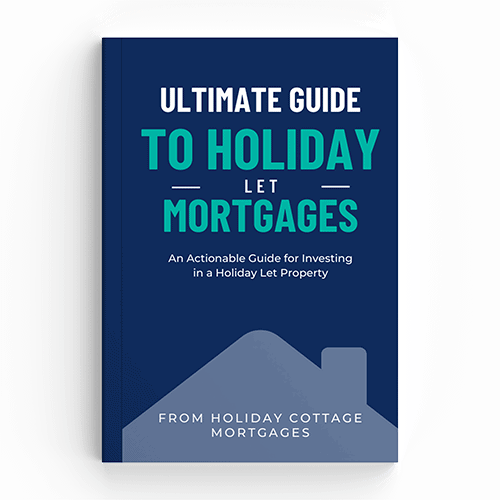If you’re hoping to secure a holiday let mortgage, you need to understand the concept of ‘loan to value’ and how it works, as it has huge implications for your deposit and mortgage payments. In this guide, we will discuss loan to value in relation to holiday let mortgages.
What is loan to value (LTV)?
If you’re just beginning to research holiday let mortgages, your first question is probably, “what is loan to value?” In its simplest terms, loan to value is the maximum amount that you can borrow from a mortgage lender, in relation to the value of the property.

How do I calculate loan to value (LTV)?
The loan to value amount is expressed as a percentage: this percentage reflects the amount of the property that is mortgaged (in other words, owned by the mortgage lenders).
For example, you want to buy a property that’s £300,000 and have a deposit of £75,000. In this case, you will need a mortgage of £225,000 which would be a loan to value of 75%.
To calculate loan to value, you need to divide the value of the mortgage you need by the property value you want to buy. Then, convert the answer into a percentage. So, as with the figures above:
Mortgage needed = £225,000
Property value = £300,000
So, your loan to value calculation would be:
225,000 divided by 300,000 = 0.75
0.75 is equivalent to 75%, so the loan to value in this situation is 75%. You could also use a loan to value calculator to do the work for you; there are plenty of reliable calculators online.
What is a good loan to value ratio?
As the loan to value ratio increases, there is greater risk for the mortgage lender because they will be lending out more money in relation to the property, and so the amount of equity left in the property reduces. As with the figures below:
| Property value | Loan to value % | Loan from mortgage lender | Equity |
| £300,000 | 65% | £195,000 | £105,000 |
| £300,000 | 75% | £225,000 | £75,000 |
| £300,000 | 85% | £240,000 | £60,000 |
With holiday let properties, the maximum loan size you can get is generally 75% to 80%. This means that you’re looking at putting down a mortgage deposit of at least 25% to 20%. If you put down a larger mortgage deposit, the loan to value of the property reduces, which means more equity left in the property and less risk to the lender. As a result, the mortgage interest rates will also reduce in most cases – a definite positive for buyers!
With the maximum loan to value size of 80%, you’ve got a set of interest rates. If you put down a larger deposit, say 30%, then the loan to value decreases to 70% and you should get a slight improvement on the interest rates.
This pattern continues; if you put down even more mortgage deposit, up to 40%, the loan to value (LTV) decreases even lower to 60% and you will be able to get the best interest rates possible. This is normally the lowest point at which rates change.
So, if you’re questioning what a good loan to value ratio is, you’ll want to think about the deposit you can afford, as well as the interest rates you want to aim for. There isn’t one right answer. Some buyers will want to get the best interest rates possible, and have disposable funds, so will put down a deposit of at least 40%. Other buyers will want to spend less money initially, so will put down the minimum deposit of 20% to 25%.

Buy-to-let and holiday let mortgages (LTV ratios compared)
Compared to regular residential mortgages, there is more importance on the figures when it comes to buy-to-let loan to value and holiday let loan to value ratios. As discussed, loan to value will have an impact on your monthly mortgage payments. With buy-to-let mortgages and holiday let mortgages, the mortgage provider will want assurance that your monthly rental income will cover these mortgage payments.
So, if the loan to value is high, your mortgage repayments will be high too. As a result, there is far more risk to the mortgage lender (and why lower LTV mortgages are preferred); they will need assurance from a reputable agent that your estimated rental income will be high enough to cover the monthly payments.
Benefits of a high loan to value
A high loan to value on your holiday let means you’ll be paying a lower deposit. The main advantage here is that you’ll either be able to afford the property sooner (before needing time to save more money), or that you’ll have more money left in the bank to furnish and market your property.
Benefits of a low loan to value
While it means spending more money on your initial holiday let mortgage deposit, a low loan to value results in better interest rates on your mortgage deal. There will also be more mortgage lenders willing to loan to you, as the risk for them is much lower.
Want more information?
If you’re hoping to start your holiday letting journey and want to know more about how to get a mortgage, contact us here or fill out our consultation form here.

Get your copy today!
Free eBook: The Ultimate Guide to Holiday Let Mortgages
FCA disclaimer
The information contained in this article is accurate at the time of writing, based on our research. Rules, criteria and regulations change all the time and so please speak to one of our Consultants to confirm the most accurate up to date information. Nothing in this article constitutes financial advice. You understand that by clicking any external links on this page that you will be leaving the website of Holiday Cottage Mortgages and we cannot be held responsible for the content of this external website. Please always consult your accountant or solicitor for all financial, taxation or legal matters.